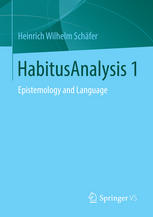

Most ebook files are in PDF format, so you can easily read them using various software such as Foxit Reader or directly on the Google Chrome browser.
Some ebook files are released by publishers in other formats such as .awz, .mobi, .epub, .fb2, etc. You may need to install specific software to read these formats on mobile/PC, such as Calibre.
Please read the tutorial at this link: https://ebookbell.com/faq
We offer FREE conversion to the popular formats you request; however, this may take some time. Therefore, right after payment, please email us, and we will try to provide the service as quickly as possible.
For some exceptional file formats or broken links (if any), please refrain from opening any disputes. Instead, email us first, and we will try to assist within a maximum of 6 hours.
EbookBell Team

4.7
96 reviewsThis book is the first of three volumes of HabitusAnalysis that take the sociology of Pierre Bourdieu as a starting point to develop a methodical approach to the habitus of social actors. However, the concept of habitus and Bourdieu’s approach to language are somewhat disputed while his relationist epistemology is seldom paid tribute to. The present volume therefore in its first part deals with Bourdieu’s roots in relationist Neo-Kantian philosophy, the basic traits of his relationist sociology. The second part examines Bourdieu’s theoretical and empirical work on language before elaborating its own praxeological concept of language use that opens the road to a methodically and theoretically sound reconstruction of the habitus of social actors. In the second volume of HabitusAnalysis we will carefully re-read Bourdieu’s theory in order to develop a disposition-based theory of the habitus that emphasizes the creative potential of the linkage between mental orientations and socio-structural processes, classification and classes, as well as dispositions and positions. The method presented in the third volume will facilitate a detailed empirical analysis of the creative transformations operated by the habitus in relation with the social structures of domination and the dynamics of social differentiation.